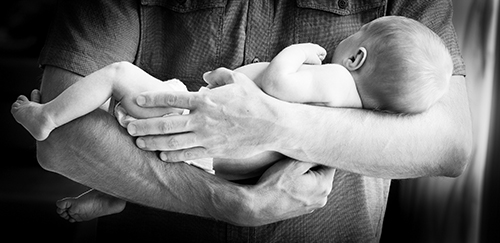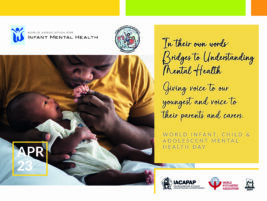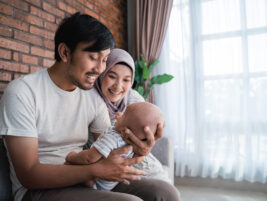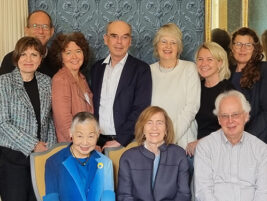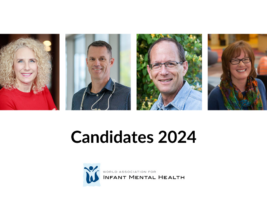Preamble and Rationale
We, as professionals and members of the World Association for Infant Mental Health (WAIMH) who work with infants and parents within different cultures and societies, affirm that there is a need to recognize specific Rights of Infants, beyond those which have already been specified in the United Nations Convention on the Rights of the Child (UNCRC, adopted 1990). We fully support the United Nations Convention on the Rights of the child, and the subsequent document from the United Nations Committee on the Rights of the Child, General Comment Number 7, published in 2005, concerning the implementation of children’s rights in early childhood. We affirm that the UNCRC in addressing the rights of children, does not sufficiently differentiate the needs of infants and toddlers from those of older children, in that infants and toddlers are totally dependent upon the availability of consistent and responsive care from specific adults for the adequate development of their basic human capacities. There are unique considerations regarding the needs of infants during the first three years of life which are highlighted by contemporary knowledge, underscoring the impact of early experience on the development of human infant brain and mind.
Drawing attention to the particular needs and rights of the child in the first years of life is needed for several reasons. An all-too-common view is that the baby is “too small to really understand or to remember” and thus the baby’s perspective is often not appreciated by health professionals and even by parents. Infants have unique nonverbal ways of expressing themselves and their capacities to feel, to form close and secure relationships, and to explore the environment and learn – all of which require appropriate nurturing since they are fundamental for building a lifetime of mental and physical health. Moreover, infant needs and rights are often overlooked in the midst of conflicted priorities for rights of older children and parents (such as in custody disputes). Further, specifying the unique needs and rights of the child in the first years of life is needed in order to motivate infant oriented actions and policies at both community and societal levels. In spite of the existence of the CRC, many societies around the globe still pay insufficient attention to infants, especially in times of stress and trauma. Additionally, consideration of infant needs and rights could guide policies of supports for mothers, fathers and caregivers, and in giving value to babies in contexts of risk and violence.
As indicated in the WAIMH by-laws, our aims include “…to promote education, research, and to promote the development of scientifically-based programs of care, intervention and prevention of mental impairment in infancy”. Our forming a Declaration of Infants Rights represent a significant step WAIMH Board has actually decided upon, that is to be action-oriented and to take explicit ethical stance and advocacy positions.
This Declaration is divided into two parts: the Infant’s basic rights, that should be endorsed everywhere, regardless of society and cultural norms, and the principles for health policy that are more sociocultural context- dependent
I. Basic Principles of Infant Rights (Birth to three years of age)
1. The Infant by reason of his/her physical and mental immaturity and absolute dependence needs special safeguards and care, including appropriate legal protection.
2. Caregiving relationships that are sensitive and responsive to infant needs are critical to human development and thereby constitute a basic right of infancy. The Infant therefore has the right to have his/her most important primary caregiver relationships recognized and understood, with the continuity of attachment valued and protected– especially in circumstances of parental separation and loss. This implies giving attention to unique ways that infants express themselves and educating mothers, fathers, caregivers and professionals in their recognition of relationship-based attachment behaviors.
3. The Infant is to be considered as a vital member of his/her family, registered as a citizen, and having the right for identity from the moment of birth. Moreover, the infant’s status of a person is to include equal value for life regardless of gender or any individual characteristics such as those of disability.
4. The Infant has the right to be given nurturance that includes love, physical and emotional safety, adequate nutrition and sleep, in order to promote normal development.
5. The Infant has the right to be protected from neglect, physical, sexual and emotional abuse, including infant trafficking.
6. The Infant has the right to have access to professional help whenever exposed directly or indirectly to traumatic events.
7. Infants with life-limiting conditions need access to palliative services, based on the same standards that stand in the society for older children.
II. Social and Health Policy Areas to be informed by these Principles:
1. Policies that support adequate parental leave so that parents can provide optimal care for their infants during the crucial early years of life.
2. Policies that minimize changes in caregiver during the early years of development.
3. Policies that promote the provision of informational support to parents regarding the developmental needs of their infants and young children.
4. Policies that recognize the importance of facilitating emotional support for mothers, fathers, and caregivers, as an important component of fostering the optimal development and well-being of the infant.
5. Policies that promote access to evaluation and treatment of risks to development by trained professionals who are culturally sensitive and knowledgeable about early development and emotional health.
6. Infants with life-limiting conditions need access to palliative services.
7. The provision of adequate circumstances, including time for mothers, fathers, caregivers to get to know their infants and become skilled in providing for their infant’s care and comfort, throughout the support of their family and community. The right for parental leave, and its duration, should be valorized by the society, in a way that fits its contextual reality.
8. The provision of access to relevant early educational and psychological opportunities and programs that promote good-enough relationship experiences and thus, enhance cognitive and socio-emotional development.
9. Policies that ensure the provision of prompt access to effective mental health treatment for mothers, fathers, and caregivers that alleviates infants’ suffering and insure optimal development for the child.
10. Policies that allocate resources for training and supervision for caregivers in babies’ institutions, foster care professionals and foster parents, as well as resources for assessing and treating foster care infant’s emotional and developmental status.
Appendix A.
WAIMH endorses the 10 principles of the UN Convention on the Rights of Children (as passed by the General Assembly of UN in 1989, and activated in Sept. 1990 with 54 Articles in total) that is:
1. The child shall enjoy all the rights set forth in this Declaration. Every child, without any exception whatsoever, shall be entitled to these rights, without distinction or discrimination on account of race, colour, sex, language, religion, political or other opinion, national or social origin, property, birth or other status, whether of himself or of his family.
2. The child shall enjoy special protection, and shall be given opportunities and facilities, by law and by other means, to enable him to develop physically, mentally, morally, spiritually and socially in a healthy and normal manner and in conditions of freedom and dignity. In the enactment of laws for this purpose, the best interests of the child shall be the paramount consideration.
3. The child shall be entitled from his birth to a name and a nationality.
4. The child shall enjoy the benefits of social security. He shall be entitled to grow and develop in health; to this end, special care and protection shall be provided both to him and to his mother, including adequate pre-natal and post-natal care. The child shall have the right to adequate nutrition, housing, recreation and medical services.
5. The child who is physically, mentally or socially handicapped shall be given the special treatment, education and care required by his particular condition.
6. The child, for the full and harmonious development of his personality, needs love and understanding. He shall, wherever possible, grow up in the care and under the responsibility of his parents, and, in any case, in an atmosphere of affection and of moral and material security; a child of tender years shall not, save in exceptional circumstances, be separated from his mother. Society and the public authorities shall have the duty to extend particular care to children without a family and to those without adequate means of support. Payment of State and other assistance towards the maintenance of children of large families is desirable.
7. The child is entitled to receive education, which shall be free and compulsory, at least in the elementary stages. He shall be given an education which will promote his general culture and enable him, on a basis of equal opportunity, to develop his abilities, his individual judgement, and his sense of moral and social responsibility, and to become a useful member of society. The best interests of the child shall be the guiding principle of those responsible for his education and guidance; that responsibility lies in the first place with his parents. The child shall have full opportunity for play and recreation, which should be directed to the same purposes as education; society and the public authorities shall endeavor to promote the enjoyment of this right.
8. The child shall in all circumstances be among the first to receive protection and relief.
9. The child shall be protected against all forms of neglect, cruelty and exploitation. He shall not be the subject of traffic, in any form. The child shall not be admitted to employment before an appropriate minimum age; he shall in no case be caused or permitted to engage in any occupation or employment which would prejudice his health or education, or interfere with his physical, mental or moral development.
10. The child shall be protected from practices which may foster racial, religious and any other form of discrimination. He shall be brought up in a spirit of understanding, tolerance, friendship among peoples, peace and universal brotherhood, and in full consciousness that his energy and talents should be devoted to the service of his fellow men.
Additionally, WAIMH endorses the points published in 2005 by the UN Committee on the Rights of the Child as “General Comment No. 7”, that emphasizes the need to include all young children i.e. at birth throughout infancy, during the preschool years, as well as during the transition to school. Through this general comment, the Committee made clear that young children are holders of all rights enshrined in the Convention and that early childhood is a critical period for the realization of these rights, where parents and state parties play a major role. Assistance to parents is also mentioned as a right of the young child. A special section is dedicated to young children in need of special protection.
Appendix B.
As a background for the Declaration of Infant’s Rights, WAIMH also endorses the United Nations Millennium Development Goals that include:
1. The eradication of extreme poverty and hunger
2. The achievement of universal primary education
3. Gender equality and women’s empowerment
4. The reduction of child mortality
5. Improvement of maternal health
6. Combating HIV/AIDS, malaria and other diseases
7. Ensuring environmental sustainability
8. Ensuring global partnerships for development.
Key documents underpinning the Declaration
Bartlett, S. (2005). “An Alternative Model for Responding to Children in Poverty: The Work of the Alliance in Mumbai and Other Cities.” Children, Youth and Environments 15(2): 342-355.
Bernard van Leer Foundation (2009). Early Childhood Matters.
Child Rights Connect: formerly the NGO group for the CRC (2013). Retrieved 06/07/2015, from https://www.childrightsconnect.org/.
Committee on the Rights of the Child (2015). “Committee on the Rights of the Child.” Retrieved 06/07/2015, from https://www.ohchr.org/EN/HRBodies/CRC/Pages/CRCIndex.aspx.
Council of Europe Commissioner for Human Rights (2014). Retrieved 06/07/2015, from https://www.coe.int/en/web/commissioner
Irwin, L., et al. (2007). Early Child Development: A Powerful Equalizer. Final Report for the WHO’s commission on the Social Determinants of Health. Vancouver, Human Early Learning Partnership (HELP), University of British Columbia.
MacNaughton, G., et al. (2007). “Young Children’s Rights and Public Policy: Practices and Possibilities for Citizenship in the Early Years.” Children & Society 21(6): 458-469.
United Nations (1959). Declaration of the Rights of the Child: 164-165.
United Nations Convention on the Rights of the Child: Adopted and opened for signature, ratification and accession by General Assembly resolution 44/25 of 20 November 1989; entry into force 2 September 1990, in accordance with article 49. Retrieved 7/3/16; https://www.ohchr.org/en/professionalinterest/pages/crc.aspx
United Nations (2005). The UN Committee on the Rights of the Child’s: General Comment 7: Implementing Child Rights in Early Childhood.
United Nations Human Rights Office of the High Commissioner Europe Regional Office (2011). Rights of Vulnerable Children under the Age of 3, Ending Their Placement in Institutional Care.
WAIMH Position Paper on the Rights of Infants
Authors
WAIMH,
United States


